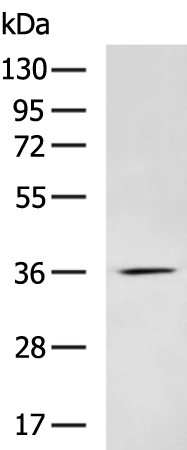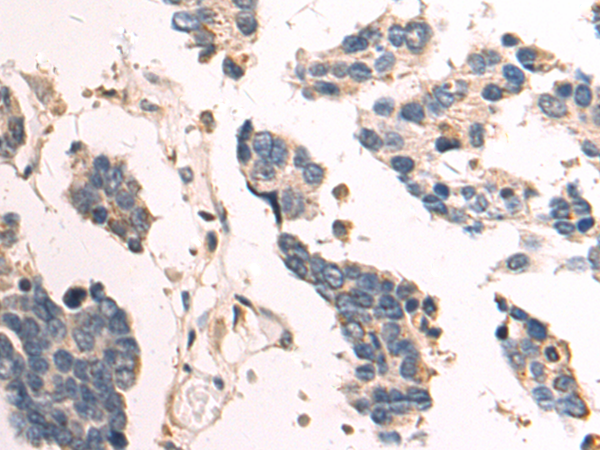

| WB | 1/500-1/2000 | Human,Mouse,Rat |
| IF | 咨询技术 | Human,Mouse,Rat |
| IHC | 1/50-1/200 | Human,Mouse,Rat |
| ICC | 技术咨询 | Human,Mouse,Rat |
| FCM | 咨询技术 | Human,Mouse,Rat |
| Elisa | 1/5000-1/10000 | Human,Mouse,Rat |
| Aliases | MCH3; CMH-1; LICE2; CASP-7; ICE-LAP3 |
| WB Predicted band size | 34 kDa |
| Host/Isotype | Rabbit IgG |
| Antibody Type | Primary antibody |
| Storage | Store at 4°C short term. Aliquot and store at -20°C long term. Avoid freeze/thaw cycles. |
| Species Reactivity | Human, Mouse |
| Immunogen | Fusion protein of human CASP7 |
| Formulation | Purified antibody in PBS with 0.05% sodium azide and 50% glycerol. |
+ +
以下是关于CASP7抗体的参考文献示例(注:部分信息为简化示例,实际引用请核对原文):
---
1. **标题**:*Caspase-7: A Mediator of Apoptosis in Human Cells*
**作者**:Thornberry, N.A. et al.
**摘要**:该研究阐明了CASP7在细胞凋亡中的关键作用,利用特异性抗体检测其在凋亡过程中的激活形式,证实其通过切割底物蛋白促进程序性细胞死亡。
2. **标题**:*Antibody-Based Detection of Active Caspase-7 in Cancer Tissues*
**作者**:Riedl, S.J. et al.
**摘要**:开发了一种高特异性CASP7抗体,用于免疫组化检测肿瘤样本中活化的CASP7.发现其在化疗敏感性与预后评估中的潜在应用价值。
3. **标题**:*Caspase-7 Activation in Neurodegenerative Disease Models*
**作者**:Siegel, R.M. et al.
**摘要**:通过Western blot和免疫荧光技术,使用CASP7抗体研究阿尔茨海默病模型中的酶活性变化,提示其与神经元凋亡及病理进展相关。
4. **标题**:*Structural Insights into Caspase-7 Inhibition by XIAP*
**作者**:Shiozaki, E.N. et al.
**摘要**:结合X射线晶体学与抗体表位定位,解析了CASP7与XIAP蛋白的相互作用机制,为靶向凋亡通路的药物设计提供依据。
---
**建议**:实际研究中,可通过PubMed或Google Scholar以“CASP7 antibody”、“caspase-7 detection”等关键词检索最新文献,并关注高影响力期刊(如*Cell Death & Differentiation*、*Journal of Biological Chemistry*)。
CASP7 (Caspase-7) is a member of the cysteine-aspartic acid protease (caspase) family, playing a critical role in programmed cell death (apoptosis). As an executioner caspase, it is activated by upstream initiator caspases (e.g., Caspase-3) during the apoptotic cascade. CASP7 exists as an inactive zymogen (pro-CASP7) that undergoes proteolytic cleavage to form active subunits (large and small), which mediate the cleavage of cellular substrates like PARP, leading to cell disassembly. Dysregulation of CASP7 is implicated in cancer, neurodegenerative diseases, and autoimmune disorders.
CASP7 antibodies are essential tools for studying apoptosis mechanisms. They detect both pro-CASP7 (∼35 kDa) and active cleaved forms (∼20 kDa and ∼12 kDa) via Western blot (WB), immunohistochemistry (IHC), or immunofluorescence (IF). These antibodies are widely used to evaluate apoptosis in cancer research, drug development, and studies of diseases linked to aberrant cell death. Monoclonal and polyclonal CASP7 antibodies are available, often validated for specificity in human, mouse, or rat samples. Researchers rely on these antibodies to assess CASP7 expression levels, activation status, and subcellular localization in tissues or cultured cells, providing insights into disease pathways and therapeutic targets. Proper controls (e.g., knockout validation) are critical to ensure antibody specificity in experimental settings.
×